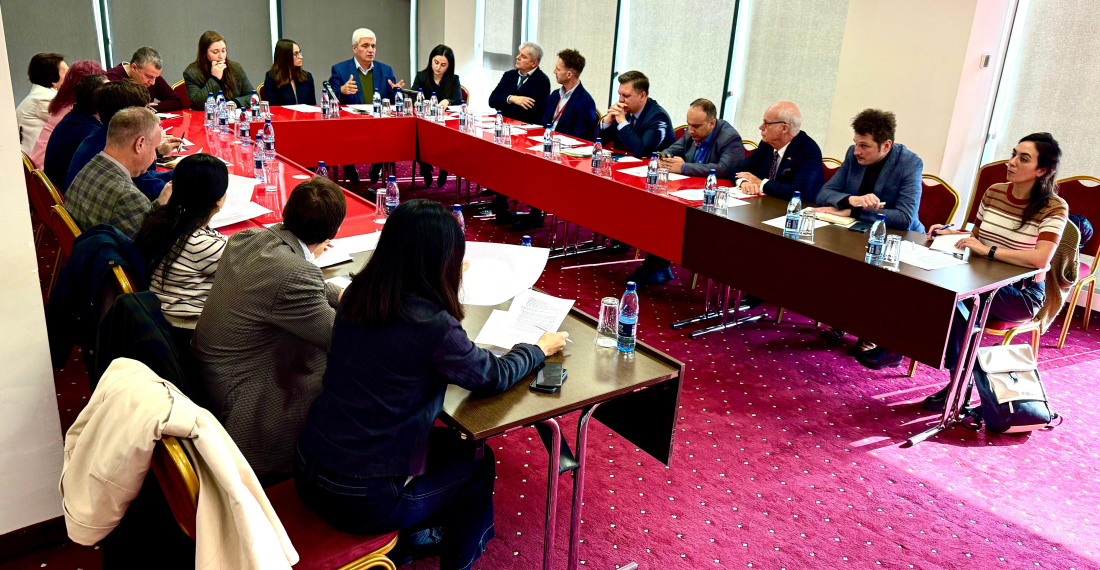The meeting titled “The residue of conflict: Landmines and other remnants of war in the South Caucasus, and its victims” was held in Yerevan, Armenia on Monday, 24 November 2025, in the framework of the 2025 regional campaign "Landmine Free South Caucasus" (LFSC25).
On behalf of the co-organisers, Mr Stepan Grigoryan, chairman of the Armenian Analytical Center on Globalisation and Regional Cooperation, and Ms Alexandra Dumitrescu, Senior Research Assistant at LINKS Europe Foundation, welcomed participants.
Addressing the meeting, Mr Stepan Grigoryan, Chairman of the Armenian Analytical Center on Globalisation and Regional Cooperation, emphasized that the problem of landmines is mutual, and it exists in both Armenia and Azerbaijan. He argued that it is important in the peace process to address the humanitarian issues caused by landmines. In addition, he also stressed that it is important for experts to have conversations on the topic of demining, as often it is experts who begin the process that can then be taken further by governments.
Stepan Grigoryan said he was happy to be collaborating with LINKS Europe on this important issue, and was glad to associate himself with the LFSC 25 appeal.
Anahit Poghosyan, Adviser to the Secretary of the Republic of Armenia Security Council also spoke at the event. Ms Anahit Poghosyan said that the problem of landmines exists in Armenia, and that already around 800 people have been injured or killed due to landmine contamination. The border regions are highly affected, and around 200000 people live in proximity of contaminated areas. She stressed that landmine contamination is an important issue to solve. In addition, she added that Armenia remains committed to humanitarian principles and that experts have been involved in checking the contamination maps to ensure reliability. She ended on an important note that landmines undermine peace and development and pose a grave humanitarian situation in the region.
Mr Benyamin Poghosyan, a member of the LINKS Europe Armenia-Azerbaijan Strategic Platform, spoke about the situation between Armenia and Azerbaijan since the meeting in Washington in August 2025. He stressed the humanitarian challenges posed by landmines.
The meeting was attended by diplomats from several countries, including representatives from the Netherlands, Germany, UK, Czechia, Georgia, EU delegation, EU mission to Armenia, Romania, Canada and Belgium alongside experts from the Friedrich Ebert Foundation and Ukrainian community, and Armenian NGOs.
In addition, Benyamin Poghosyan and Jonny Melikyan, members of the LINKS Europe strategic platform also joined the meeting.
In his message to the event, read at the start of the meeting, LINKS Executive Director, Dr Dennis Sammut, said that was the fourth time since 2019 that LINKS Europe is co-ordinating the regional campaign “Landmine Free South Caucasus”, and the third time a meeting with Armenian stakeholders was being held in Yerevan.
He thanked the Armenian Analytical Center on Globalisation and Regional Cooperation, and its president, Mr Stepan Grigoryan for being partners in organising the meeting and said he looked forward to working with him and his centre, on this, and many other issues, in the future
Mr Dennis Sammut said in his message:
Organising a regional campaign in the South Caucasus on landmine issues has not been easy, in fact it was often difficult and complicated. We were often misunderstood, and our motives questioned. But we persisted, and we persist. Today we are at the dawn of a new reality in the South Caucasus, Peace is within the grasp of the people of Armenia and Azerbaijan. All three countries of the region are contaminated by landmines and remnants of war; some more than others, but no one country can say they don’t have a problem. These problems should now unite us in working for a common strategy and solution. Let us work together for a Landmine Free Armenia and a Landmine Free South Caucasus.
source: commonspace.eu
photo: Mr Stepan Grigoryan addressing the meeting in Yerevan on 24 November 2025 (picture (c) commonspace.eu)





